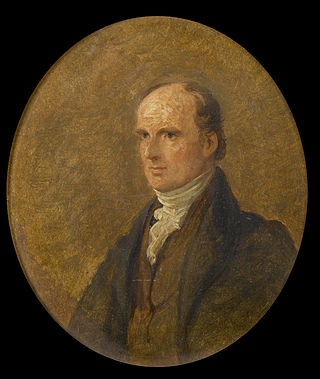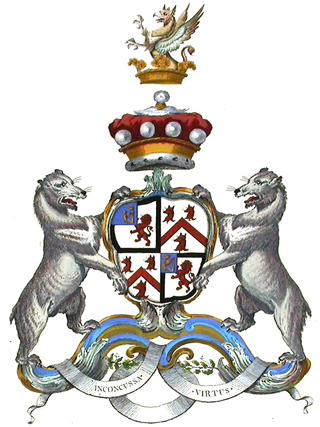Related Research Articles

John Charles Spencer, 3rd Earl Spencer,, styled Viscount Althorp from 1783 to 1834, was a British statesman and abolitionist. He was Chancellor of the Exchequer under Lord Grey and Lord Melbourne from 1830 to 1834. Due to his reputation for integrity, he was nicknamed "Honest Jack".

James Ballantyne was a Scottish solicitor, editor and publisher who worked for his friend Sir Walter Scott. His brother John Ballantyne (1774–1821) was also with the publishing firm, which is noted for the publication of the Novelist's Library (1820), and many works edited or written by Scott.

Henry Warburton was an English merchant and politician, and also an enthusiastic amateur scientist.
Henry John Boulton, was a lawyer and political figure in Upper Canada and the Province of Canada, as well as Chief Justice of Newfoundland.

Trinity is a small town located on Trinity Bay in Newfoundland and Labrador. The town contains a number of buildings recognized as Registered Heritage Structures by the Heritage Foundation of Newfoundland and Labrador.

The 1832 Newfoundland general election came after many years of agitation against the British Parliament. Newfoundland was the last British colony in North America to gain representative government.
George Garland was an early Newfoundland merchant and magistrate.
Benjamin Lester was a British politician and merchant involved in the Newfoundland fishery.
George Garland of Purbeck, Dorset was an English politician and merchant involved in the Newfoundland fishery.
William Bickford Row was an English-born Newfoundland merchant, lawyer and politician.

George Fox-Lane, 1st Baron Bingley was a British peer and Tory politician.
John Wills Martin was an English-born merchant and political figure in Newfoundland. He represented Placentia and St. Mary's in the Newfoundland and Labrador House of Assembly from 1832 to 1836.
George Bankes was the last of the Cursitor Barons of the Exchequer, the office being abolished by Conservative ministry of the Earl of Derby in 1852. Without any legal experience at the bar, he was the last barrister to be appointed to the post considered to be a medieval anachronism.

Benjamin Cribb was an Australian businessman and politician. He was an unaligned Member of the New South Wales Legislative Assembly for one term in 1858–1859 and a Member of the Queensland Legislative Assembly in 1861–1867 and again in 1870–1873.
The members of the 1st General Assembly of Newfoundland were elected in the Newfoundland general election held in November 1832, the first general election for the colony. The general assembly sat from January 1, 1833 until 1836.
John Peyton Sr. (1749–1829) was an English-born fisherman and trapper in the Colony of Newfoundland.
Robert Oke, H.M. was the first chief inspector for the Newfoundland Lighthouse Service and served from at least 1848 to 1870. Oke installed the first light mechanism at the Cape Bonavista Light in 1842, and installed the famous Isle of May light mechanism at the Cape Pine Light in 1850, which was later moved to Harbour Grace Island and finally to Cape Bonavista, where it can be viewed today.
Sir Randolph Isham Routh was a British Army officer reaching the rank of Commissary-General. He was senior Commissariat officer at the Battle of Waterloo.
George Richard Robinson was a British Peelite, Conservative and Whig politician.
The Wessex Society of Newfoundland and Labrador is a not-for-profit, volunteer-run organization established to promote Newfoundland and Labrador's connections with the West Country of England, and to celebrate other ethnocultural traditions in Newfoundland and Labrador. The organization was officially charted 25 October 1984 by educator and heritage activist Otto Tucker to facilitate "understanding of Newfoundland's origins in southwest England." Its UK-based sister organization is the similarly-named Wessex Newfoundland Society.
References
- 1 2 3 4 "John Bingley Garland". Memorial University.
- 1 2 "Garland, John Bingley". Encyclopedia of Newfoundland and Labrador . pp. 481–82. ISBN 0-9693422-1-7.